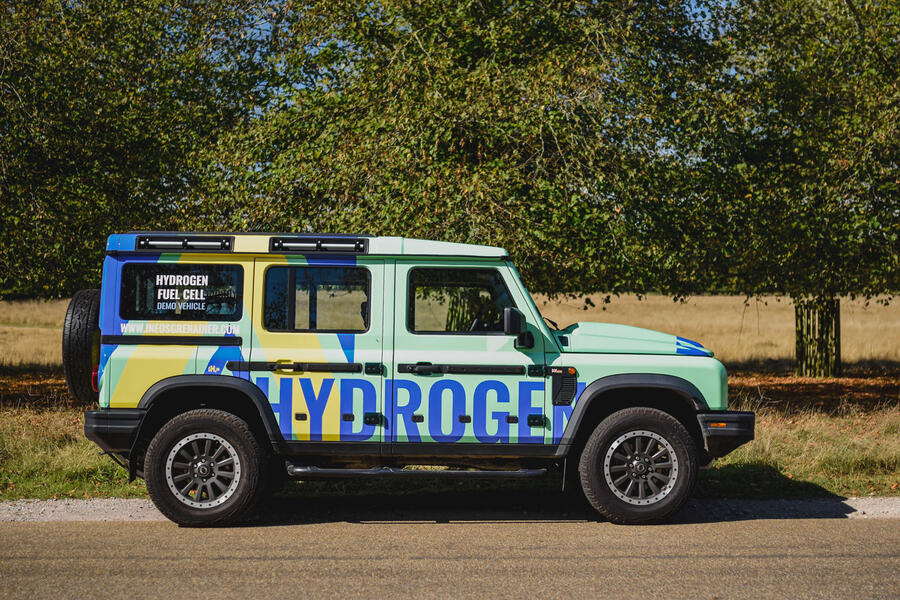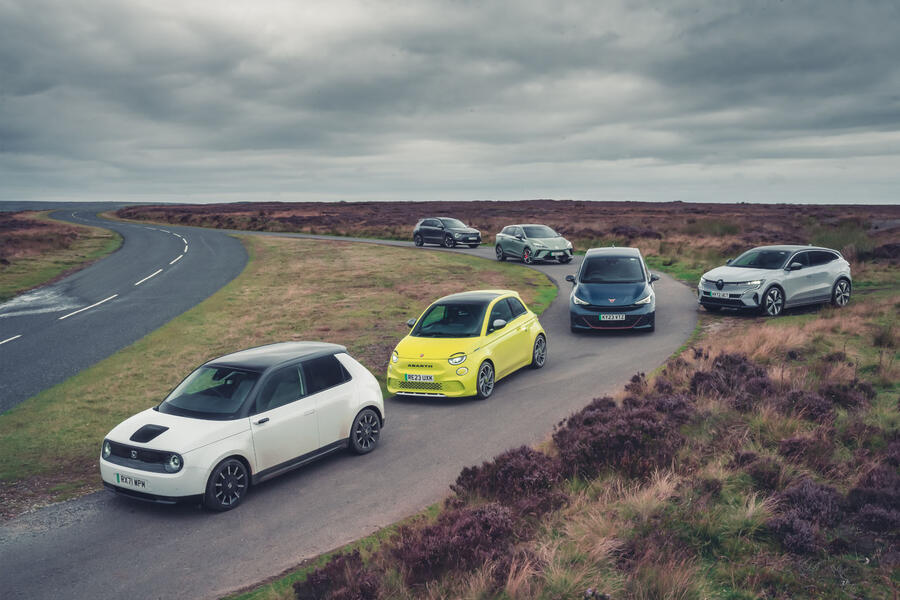The government will only allow new zero-emission cars to be sold from 2035 onwards
Our response to the UK government consultation on plans to ban the sale of new non-zero emission cars and vans
Ever since 2020, when then prime minister Boris Johnson first outlined plans to ban the sale of new non-zero emission cars from 2030 onwards, there has been more confusion than clarity.
Under various subsequent UK governments, the date has moved from 2030 to 2035 and back, and all the while there has been a plan to allow the sale of certain hybrids – although nobody has yet specified exactly which sort. For car firms used to planning years in advance, it has been hugely problematic. For car buyers, this huge dollop of uncertainty has left many unsure what they should buy, or when.
But the current government has promised certainty, with a pledge to reinstate that 2030 date – and while some hybrids will be allowed on sale until 2035, there’s now finally a promise to specify details.
At the same time, the government is looking at refining some aspects of the zero-emission vehicle (ZEV) mandate, which requires firms to sell an increasing percentage of EVs to avoid punitive fines. With the targets running ahead of consumer demand, it warped the market in 2024.
The first step to clarity is an ongoing government consultation, which seeks feedback on various aspects of the ICE phaseout and ZEV mandate. As we did with the original 2020 consultation (1 July 2020) Autocar feels it is vital to make our voice heard and we have submitted our own response.
We only answered the questions that only related to vans and commercial vehicles, or on other areas where we have no direct expertise. But here is our full response to all the questions that we addressed.
We’ve outlined how you can have your day at the bottom of this piece.
Part 1: 2030 phase out of new ICE cars, and CO2 requirements for vans
Question 1: Do you agree with the Government’s view that full hybrid and plug-in hybrid technologies only should be considered? Please explain your answer.
Autocar supports the electrification of the UK car parc, both as a way of cutting emissions in our towns and cities and eliminating the CO2 output of cars and vans on UK roads. It is clear to us, and the wider car industry, that these are desirable outcomes. However, there are technologies other than HEV and PHEV that are also low or zero-emission capable at the tailpipe – such as hydrogen fuel cell, hydrogen combustion and synthetic e-fuels. While there are questions about the viability of such technologies, we would support a solution that encourages innovation in different energy sources that might prove viable long-term.

Question 2: Do you prefer a technological definition that permits both HEVs and PHEVs, or a technological definition that permits PHEVs only? Please explain your answer.
We would prefer a definition that sets standards, rather than enforcing specific solutions. For example, as the legislation is written at the moment range-extender electric vehicle technology that is rapidly taking off in China, a kind of halfway house between plug-in hybrids and full electric vehicles, is effectively banned in the UK before it even has a chance to launch. It should not be down to legislators to prescribe the solution to the problem, as has happened with a legislative path now that only leads to battery electric vehicles. While the goal may ultimately be zero emissions, to facilitate that the focus should be on reducing CO2 emissions and the more technologies that can contribute to that the better.

Question 3: Do you support no further CO2 requirements, a vehicle level CO2 cap, or a fleetwide CO2 requirement? Please explain your answer.
We would favour a fleetwide CO2 scheme, because it allows some flexibility for firms to offer a more diverse line-up of vehicles to meet consumer demand. This must also include vans. The climate does not discriminate about emissions and where they have come from, so it is nonsensical to treat a manufacturer’s van emissions as a separate entity to its car ones.
![]()
Question 4: Should a minimum range be required for new PHEVs and, if so, at what level should it be set? Please explain your answer.
We do not believe a minimum range should be set for PHEVs because we do not believe that figure is truly meaningful. While a PHEV vehicle might be capable of extending zero-emission running and manufacturers should be encouraged to increase this where possible, if it is not charged regularly and used correctly that figure is essentially meaningless.
Question 8: What are your views on current measures to support demand for zero emission vehicles? What additional measures could further support the transition?
While the current tax benefits for fleet and business buyers of zero-emission vehicles have proven effective, at present, there is no support to drive demand for zero-emission vehicles for private buyers. That has created an unbalanced car market with business buyers accounting for the vast majority of EV sales. That needs to be addressed with increased support from private buyers, either through incentives or tax benefits – particularly for more affordable EVs that are now arriving on the market. Even a small incentive can serve as a strong push to consumers and help address the price gap that remains between ICE vehicles and EVs.

This must too be joined up with the wider policy to road transport taxation. In the most recent budget, VED rates were raised on new internal combustion engined cars while fuel duty was frozen. Throw in the lack of incentives to buy electric cars, and together these three things simply encourage people to stay in their existing cars for longer and opportunities are missed to lower CO2 and increase the amount of zero emissions vehicles on the road.
Question 9: What are your views on whether small volume manufacturers (between 1,000 and 2,499 registrations) should be subject to the 2030 requirements for cars and/or vans?
Question 10: What are your views on whether micro-volume manufacturers (fewer than 1,000 annual registrations) should be subject to the 2030 requirements for cars and/or vans?
Question 12: What is your opinion on exemptions for kit cars from the 2030 requirements for cars and vans?
We have grouped these questions together because we have the same answer for each of them. Autocar strongly believes that small, micro-volume and kit cat manufacturers should be exempt from the 2030 requirements. Such firms are a key part of the wider British manufacturing industry, helping to drive technical innovation and employee skills development that benefit the wider economy.
Due to their low volume and the use case of most vehicles they produce, their overall impact on the UK’s CO2 emissions is negligible, while subjecting them to cost-prohibitive electrification requirements could prove insurmountable for many. Most of these vehicles will stay on the roads for decades and do minimal mileage each year. We do recognise that many of these firms are already looking at electrification solutions, so we would welcome incentives and support for them to pursue innovative and cost-effective emission-reduction technology that could ultimately benefit the wider industry.

Question 11: What is your opinion on exemptions for Special Purpose Vehicles from the 2030 requirements for cars and vans?
Current electrification technology is both costly and has limitations in certain use cases. Therefore, we feel it is important that any requirements for Special Purpose Vehicles are carefully crafted to ensure that there is no impact on the effectiveness of such machines in their intended usage.
It is worth noting that road transport of all kinds is on a trajectory of lowering emissions. Many of these vehicles will be sourced from or based on major OEM vehicles and technologies that have lower emissions regardless.
Part 2: Vehicle Emissions Trading Schemes (VETS) Updates
Question 14: What are your views on the proposal to implement a van-car transfer in VETS? Please explain your answer.
Answer. We would welcome any flexibility here for reasons outlined in question three: the climate does not discriminate about emissions and where they have come from, so it is nonsensical to treat a manufacturer’s van emissions as a separate entity to its car ones.

Question 15: Are there other flexibilities that should be considered within VETS for cars and vans?
Answer. We think it is unfair that CO2 trading is currently frozen at 2021 levels. This gives a car manufacturer no incentive to lower CO2 emissions across its whole fleet, only to sell a set number of EVs. The goal must be to reduce CO2 emissions on the way to zero emissions, and the way VETS is written at the moment doesn’t offer much encouragement for a car manufacturer to do so.
Indeed, a legitimate way to comply is simply throttling back non-zero emissions vehicle sales to artificially boost your proportional sale of zero emissions vehicles. This is surely not the intention of the scheme, and again misses out the chance to lower CO2 emissions by someone switching to a new, surely lower-CO2 emissions vehicle than the one they’re coming out of.
Have your say
The current consultation runs until Tuesday 18 February. The form can be found here and submissions must be emailed to zevmandate@dft.gov.uk or sent to ZEV regulations team, Department for Transport, 3rd Floor Great Minster House, 33 Horseferry Road, London, SW1P 4DR.
We would love to see your responses, so please email them to us at autocar@haymarket.com.


